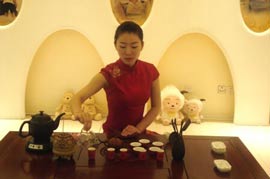Vicony Tea Directory


 |
|
| Tea House in Modern China |
Chinese Tea Ceremony
The art of drinking and serving tea plays a major cultural role in China. It inspires poetry and songs. Mutual love of tea cements lifelong friendships. For centuries, the ritual of preparing and serving tea has held a special place in the minds of Chinese aristocracy, court officials, intellectuals and poets.
The Chinese tea ceremony emphasizes the tea, rather than the ceremony -- what the tea tastes like, smells like, and how one tea tastes compared to the previous tea, or in successive rounds of drinking. Ceremony doesn't mean that each server will perform the ritual the same way; it is not related to religion. Each step is meant to be a sensory exploration and appreciation.
Chinese Tea Ceremony History
The evolution of Chinese Tea Ceremony mirrors the development of tea culture in China. At the beginning, tea was cultivated and used solely as herbal medicine mainly in temples. Monks used tea to show a respect for nature, humility and an overall sense of peace and calm. In fact, the spirit of the Chinese Tea Ceremony is described as he(和), jing(静), yi(怡), zhen(真) which mean peace, tranquility, enjoyment and truth. Monks felt they could exhibite philosophical concepts through tea service. It is for that reason that the underlying philosophies of Confucianism, Taoism and Buddhism all can be appreciated in a Chinese Tea Ceremony. Over time, people recognized the health benefits of tea but also its overall enjoyment. Tea ceremonies could be seen in both chinese imperial celebrations and ordinary people's lives.
The earliest written record of tea ceremonies emerged during the Tang Dynasty over 1200 years ago. The term to describe it was initially called cha dao (茶道)or the way of tea. Japanese monks traveling to China during this period learnt tea and tea culture. After bringing it back to Japan, tea ceremonies evolved there as it was influenced by Japanese culture resulting in the well-known Japanese Tea Ceremony and is still called cha dao.
 |
|
| Tea Ceremony Performance |
Major Aspects of A Chinese Tea Ceremony
There are six major aspects needed to be considered when performing a Chinese Tea Ceremony. The following is a summary of them.
Attitude – The person performing the ceremony should behave in an elegant and confident demeanor.
Tea Selection – A lot of factors should be taken into consideration when selecting tea. In addition to aroma, shape and taste, it would be better if the tea has a wonderful story and name.
Water Selection – The complex flavor profile wouldn't be appreciated if it was brewed with poor water. Therefore, selecting pure, light and clean water is also crucial.
Teaware Selection – It is also important to select the teaware for brewing tea leaves. In addition, allow your participants to fully appreciate the teaware by selecting both useful and beautiful items.
Ambiance – A peaceful and calm environment is to be created in a clean, comfortable and quiet room. Artwork may be used to enhance the overall atmosphere of the space.
Technique – The basic skills for brewing tea are needed but also a graceful manner reflected through hand movements, facial expressions and clothing.
The Relation Between Tea Ceremony and Chinese Traditional Culture
Prosperous development of tea ceremony in Chinese history may be ascribed to the rich and profound headspring of philosophy and cultural thoughts. It would never exist without the amalgamation and enlightenment of Confucianism, Taoism and Zen Buddhism.
People often mention the relationship between tea ceremony and Taoism while they talked about Chinese tea culture. Taoism had a huge influence on tea ceremony and shaped it. Tea ceremony is a part of “natural way”. As Lao zi (老子)pointed out: “the way of nature” will exist, no matter whenever. The viewpoint of “nature” let Taoist never to seek for fame and wealth. They prefer a frugal and peaceful life style. So tea ceremony has built its spiritual connotation as tea leaves have the same natural attribute with “the way of nature”.
See Also:

- Tea Set
- Tea and Water
- Tea Infusion Skills
- Tan Yang Congou
- Tai Ping Hou Kui
- Chun Mee Tea
- Gunpowder Tea
- Da Fang Tea
- Huo QingTea
- Green Tea Benefits
- Green Tea Effect Study
- Black Tea Effect Study
- Tea Storage
- Caffeine and Tea
| Green Tea | Black Tea | White Tea | Yellow Tea | Oolong Tea | Dark Tea | Pu Erh | Scented | Flowering | Herbal | Tea Powder |
| Navigation |
| Home (ViconyTeas) |
| Tea Directory (VTD) |
| Tea Importers |
| Tea Exporters |
| Tea Wholesalers |
| Informative Tea Web |
| Tea Association |
| Tea Encyclopedia |
| Online Tea Shop |
| Tea Dictionary Online |
Copyright©2016 | Chinese Tea Ceremony

